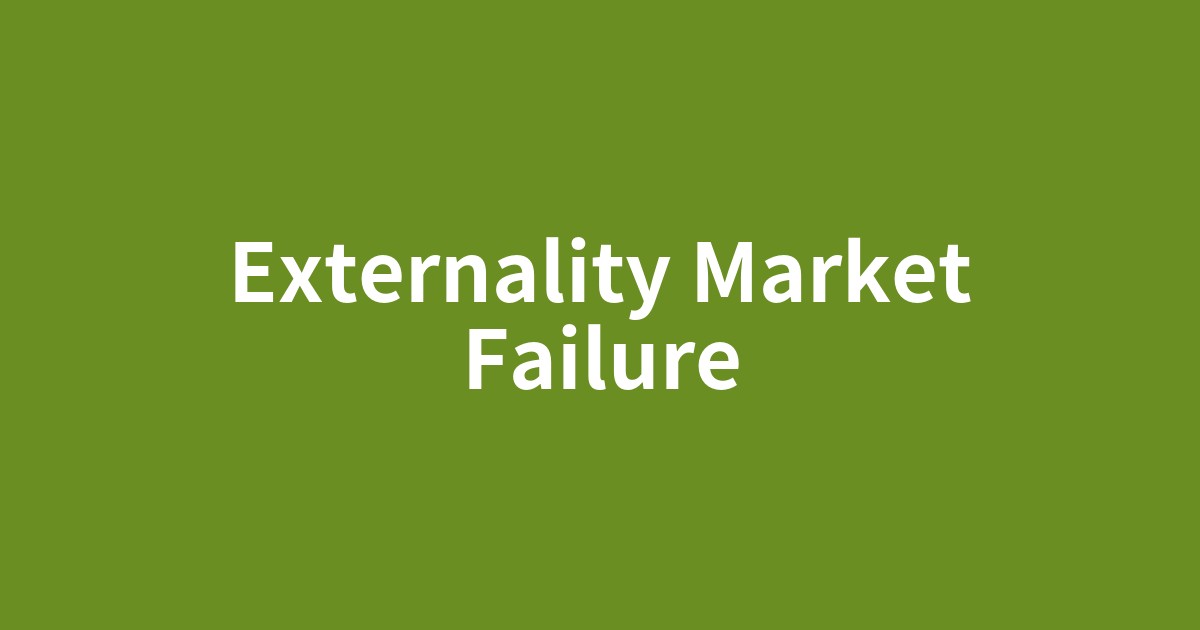このページは、歴史や文化の物語を楽しみながら、その文脈の中で重要な英単語を自然に学ぶための学習コンテンツです。各セクションの下にあるボタンで、いつでも日本語と英語を切り替えることができます。背景知識を日本語で学んだ後、英語の本文を読むことで、より深い理解と語彙力の向上を目指します。

公害のように、市場の取引の外で、第三者に不利益を与えてしまう問題。なぜ市場は万能ではなく「失敗」するのか、その理由と対策を考えます。
この記事で抑えるべきポイント
- ✓「外部性(Externality)」とは、市場取引がその取引に関与していない第三者へ意図せず影響を及ぼす現象を指します。
- ✓外部性には、公害のような「負の外部性」と、技術革新の波及効果のような「正の外部性」の二種類が存在するという見方があります。
- ✓外部性が存在すると、社会的コストや便益が市場価格に反映されず、資源が非効率に配分される「市場の失敗(Market Failure)」という状態が引き起こされる可能性があります。
- ✓市場の失敗を是正するため、政府による税金や補助金(ピグー税など)、排出権取引、当事者間の交渉(コースの定理)といった多様な対策が検討されています。
なぜ工場は、住民に迷惑をかけてまで煙を出し続けるのか?
私たちの暮らしのそばにある工場。その煙突から黙々と上がる煙を見て、「なぜ、近隣住民に迷惑がかかると分かっていながら、煙を出し続けるのだろう?」と疑問に思ったことはないでしょうか。経済学の父、アダム・スミスが提唱した「神の見えざる手」によれば、各々が自己の利益を追求すれば、結果的に社会全体の利益につながるはずでした。しかし、この工場の煙は、その「市場は万能」というイメージに静かな疑問を投げかけます。実はこれこそ、経済学が長年向き合ってきた「外部性」という根深い問題なのです。この記事では、なぜ時として市場がうまく機能しない「市場の失敗」が起こるのか、そのメカニズムを探る旅にご案内します。
Why Do Factories Keep Emitting Smoke, Even if It Bothers Residents?
Have you ever looked at the smoke rising steadily from a nearby factory chimney and wondered, "Why do they continue to emit smoke when they know it affects local residents?" According to Adam Smith, the father of economics, the "invisible hand" of the market should lead to the benefit of society as a whole when individuals pursue their own self-interest. However, this factory smoke casts a quiet doubt on the idea that the market is omnipotent. In fact, this is the very essence of a deep-rooted problem that economics has long grappled with: externality. This article will guide you on a journey to explore the mechanism of "Market Failure" and why the market sometimes fails to function properly.
見えないコストと便益:「外部性」の正体
経済活動は、通常、商品やサービスを売る側と買う側の間で完結します。しかし、その取引の影響が、まったく関係のない他人に及ぶことがあります。この、市場取引の「外」で発生する意図せざる影響こそが、「外部性(externality)」です。外部性には大きく分けて二つの顔があります。一つは、工場の排煙による大気汚染や騒音のように、他人に不利益を与える「負の外部性」。もう一つは、ある人が自宅の庭を美しく手入れすることで、道行く人々の心をも和ませるような「正の外部性」です。この問題の核心は、取引の当事者ではない「第三者(third party)」が、コストを負担させられたり、便益を無償で受け取ったりする点にあります。市場の価格メカニズムが、この見えないコストや便益を捉えきれていないのです。
Invisible Costs and Benefits: The Nature of "Externality"
Economic activities are usually completed between the seller and the buyer of a good or service. However, the effects of that transaction can sometimes spill over to completely unrelated individuals. This unintended consequence occurring "outside" the market transaction is what is known as an externality. Externalities have two main faces. One is a "negative externality," such as air pollution or noise from a factory, which imposes a cost on others. The other is a "positive externality," like when a person's beautifully maintained garden pleases passersby. The core of this issue is that a third party, who is not a party to the transaction, is forced to bear a cost or receives a benefit for free. The market's price mechanism fails to capture these invisible costs and benefits.
神の見えざる手は万能ではない?「市場の失敗」が起きる仕組み
では、外部性が存在すると、なぜ「市場の失敗(Market Failure)」が引き起こされるのでしょうか。鍵を握るのは、市場価格に反映されない「社会的費用(Social cost)」という概念です。例えば、化学工場が製品を1つ作るのにかかる費用(私的費用)は、原材料費や人件費だけです。しかし、その生産過程で排出される汚染物質は、周辺住民の健康を害したり、環境を悪化させたりするかもしれません。この社会全体が負担するコスト(社会的費用)は、製品の価格には含まれていません。その結果、工場は社会的に見て「望ましい量」以上に製品を過剰に生産し、汚染をまき散らしてしまいます。このように、財やサービスが過剰または過少に供給され、社会全体で見た最適な「資源配分(Resource allocation)」が達成されない状態、それが市場の失敗の本質です。
Is the Invisible Hand Not Omnipotent? How "Market Failure" Occurs
So, why does the presence of an externality lead to a "Market Failure"? The key lies in the concept of "Social cost," which is not reflected in the market price. For example, the cost for a chemical factory to produce one unit of a product (private cost) includes only raw materials and labor. However, the pollutants emitted during production may harm the health of nearby residents or degrade the environment. This cost borne by society as a whole (social cost) is not included in the product's price. As a result, the factory produces more of the product than is socially desirable, leading to excessive pollution. This situation, where goods or services are over- or under-supplied and the optimal "Resource allocation" for society as a whole is not achieved, is the essence of market failure.
外部性を乗り越えるための人類の知恵
市場の失敗を放置するわけにはいきません。この問題を是正するため、人類は様々な知恵を絞ってきました。最も代表的なのが、政府による市場への「介入(intervention)」です。イギリスの経済学者アーサー・ピグーが提唱した「ピグー税(Pigovian tax)」は、負の外部性を生み出す活動、例えば汚染物質の排出量に応じて課税する仕組みです。これにより企業は汚染コストを内部化せざるを得なくなり、排出量を減らすインセンティブが生まれます。逆に、研究開発のように社会に広く恩恵をもたらす活動には、「補助金(subsidy)」を支給することで、その活動を社会的に最適な水準まで促進しようとします。また、排出量の上限を定めるような直接的な「規制(regulation)」も有効な手段の一つです。一方で、政府が介入せずとも、当事者間の交渉によって解決できるとする考え方もあります。「コースの定理(Coase theorem)」と呼ばれるこの理論は、所有権が明確であれば、交渉を通じて外部性の問題は効率的に解決されうると主張し、問題解決のアプローチの多様性を示しています。
Human Ingenuity to Overcome Externalities
We cannot simply ignore market failures. To correct this problem, humanity has devised various strategies. The most typical is government intervention in the market. The "Pigovian tax," proposed by British economist Arthur Pigou, is a system that taxes activities that generate negative externalities, such as the amount of pollutants emitted. This forces companies to internalize the cost of pollution, creating an incentive to reduce emissions. Conversely, activities that provide broad benefits to society, like research and development, are encouraged with a subsidy to bring them to a socially optimal level. Direct regulation, such as setting a cap on emission levels, is also an effective tool. On the other hand, there is a school of thought that suggests problems can be solved through negotiation between the parties involved, without government intervention. This theory, known as the "Coase theorem," argues that if property rights are clearly defined, externality problems can be resolved efficiently through bargaining, showing the diversity of approaches to problem-solving.
結論:より良い社会を設計するために
ここまで見てきたように、「外部性(externality)」は、環境問題や公衆衛生、技術革新といった、現代社会が直面する多くの課題の根底に横たわっています。市場メカニズムは多くの場面で効率的な資源配分を実現する強力なツールですが、決して万能ではありません。その限界を理解し、市場の「失敗」をどのように補い、修正していくかを考える視点こそが、より公平で持続可能な社会を設計する上で不可欠です。私たちの身の回りには、どのような外部性が隠れているでしょうか。そのコストは誰が負担し、その便益は誰が享受しているのか。そうした問いを立てることが、社会をより深く理解する第一歩となるのです。
Conclusion: To Design a Better Society
As we have seen, the concept of externality underlies many of the challenges facing modern society, from environmental problems and public health to technological innovation. While the market mechanism is a powerful tool for achieving efficient resource allocation in many situations, it is by no means a panacea. Understanding its limitations and considering how to supplement and correct its "failures" is essential for designing a more equitable and sustainable society. What kinds of externalities are hidden in our own surroundings? Who bears the cost, and who enjoys the benefit? Asking such questions is the first step toward a deeper understanding of our society.
テーマを理解する重要単語
subsidy
正の外部性を促進するための代表的な「補助金」。研究開発のように、社会全体に利益をもたらす活動に対して政府が金銭的支援を行うことです。負の外部性に対する「税」と対をなす解決策として理解することが重要です。この記事を通じて、政府の介入策の具体的な二つの側面を学べます。
文脈での用例:
The renewable energy industry may campaign for government subsidies.
再生可能エネルギー業界は、政府の補助金を求めて活動することがあります。
intervention
市場の失敗を是正するための「政府による介入」。この記事では、ピグー税や補助金がその具体例として挙げられています。自由な市場に任せるのではなく、公的な力が加わるという概念を指します。市場メカニズムの限界と、それを補うためのアプローチを理解する上で不可欠な単語です。
文脈での用例:
The UN's military intervention was aimed at restoring peace in the region.
国連の軍事介入は、その地域の平和を回復することを目的としていた。
regulation
税や補助金といった価格メカニズムを通じた誘導策とは異なる、より直接的な政府の介入策が「規制」です。記事にある「排出量の上限設定」などが典型例です。intervention(介入)という大きな枠組みの中に、tax, subsidy, regulationといった具体的な手法がある、という階層構造を理解するのに役立ちます。
文脈での用例:
The government introduced stricter environmental regulations for factories.
政府は工場に対してより厳しい環境規制を導入した。
equitable
結論で目指すべき社会像として「より公平で(more equitable)持続可能な社会」と提示されています。「equal(平等な)」が機械的な均等を示すのに対し、「equitable」は状況に応じた公正さや正当性を意味するニュアンスを持ちます。外部性の問題を考えることが、単なる効率性だけでなく、社会の公正さを問うことにも繋がるという深い洞察を与えてくれます。
文脈での用例:
The company aims for an equitable distribution of profits among its employees.
その会社は、従業員間での利益の公平な分配を目指しています。
allocation
「資源配分(Resource allocation)」は、経済学の根幹をなす概念です。この記事では、外部性が存在すると、社会全体にとって最適な資源配分が達成されない「市場の失敗」が起こると説明されています。この単語は、市場が目指すべき理想の状態と、それがなぜ損なわれるのかを理解するためのキーワードです。
文脈での用例:
The efficient allocation of resources is crucial for economic growth.
資源の効率的な配分は、経済成長にとって極めて重要です。
externality
この記事の主題そのものである「外部性」。市場取引の当事者ではない第三者への意図せざる影響を指す、経済学の最重要概念です。この単語を理解することが、なぜ「神の見えざる手」が万能ではなく「市場の失敗」が起こるのか、という記事全体の論旨を掴む鍵となります。
文脈での用例:
Pollution is a classic example of a negative externality, where the social cost exceeds the private cost.
汚染は負の外部性の典型的な例であり、社会的費用が私的費用を上回ります。
third party
外部性の問題を理解する上での中心的な登場人物、「第三者」。売り手と買い手という取引の当事者(parties to the transaction)以外で、コストを負担させられたり便益を受けたりする存在を指します。この言葉を抑えることで、なぜ市場の価格メカニズムが外部性を捉えきれないのかが明確になります。
文脈での用例:
The dispute between the two companies was resolved with the help of a neutral third party.
両社間の紛争は、中立な第三者の助けを借りて解決されました。
grapple with
「経済学が長年向き合ってきた」という部分で使われ、外部性の問題がいかに複雑で解決が困難であるかを示唆しています。単に「deal with」と言うよりも、問題の深刻さや、解決に向けた懸命な努力のニュアンスが伝わります。この記事が扱うテーマの重みを理解するのに役立つ表現です。
文脈での用例:
The government is grappling with the challenge of an aging population.
政府は高齢化社会という難題に取り組んでいる。
internalize
「(コストを)内部化する」とは、企業がこれまで無視してきた社会的費用(汚染など)を、自社の費用として勘定に入れることを意味します。この記事では、ピグー税が企業に汚染コストを内部化させる仕組みとして紹介されています。外部性問題の解決策の核心的なメカニズムを理解するための専門用語です。
文脈での用例:
Children tend to internalize the values of their parents and society.
子供たちは親や社会の価値観を内面化する傾向がある。
panacea
結論部分で、市場メカニズムは「決して万能ではない(by no means a panacea)」と述べる際に使われています。この記事のメッセージ、すなわち「市場は強力なツールだが、その限界を理解し、補う視点が必要だ」という点を強調する洗練された単語です。知的な語彙として覚えておくと表現の幅が広がります。
文脈での用例:
Technology is not a panacea for all our problems.
テクノロジーは我々のすべての問題に対する万能薬ではない。
omnipotent
アダム・スミスの「神の見えざる手」が万能であるという考え方に疑問を投げかける文脈で使われています。市場が全ての問題を解決できるわけではない、という「市場の失敗」の議論の出発点を象徴する単語です。「万能ではない(not omnipotent)」という表現を通じて、記事の核心的な問いを深く理解できます。
文脈での用例:
In the story, the king was portrayed as an omnipotent ruler.
その物語では、王は全能の支配者として描かれていました。
spill over
ある経済活動の影響が、取引とは無関係な第三者に「波及する」様子を的確に表現しています。外部性が市場の「外」に漏れ出すというイメージを捉えるのに最適な句動詞です。この単語によって、外部性の本質である「意図せざる影響の広がり」を視覚的に理解することができます。
文脈での用例:
The economic crisis in that country could spill over into the global economy.
その国の経済危機は、世界経済に波及する可能性があります。